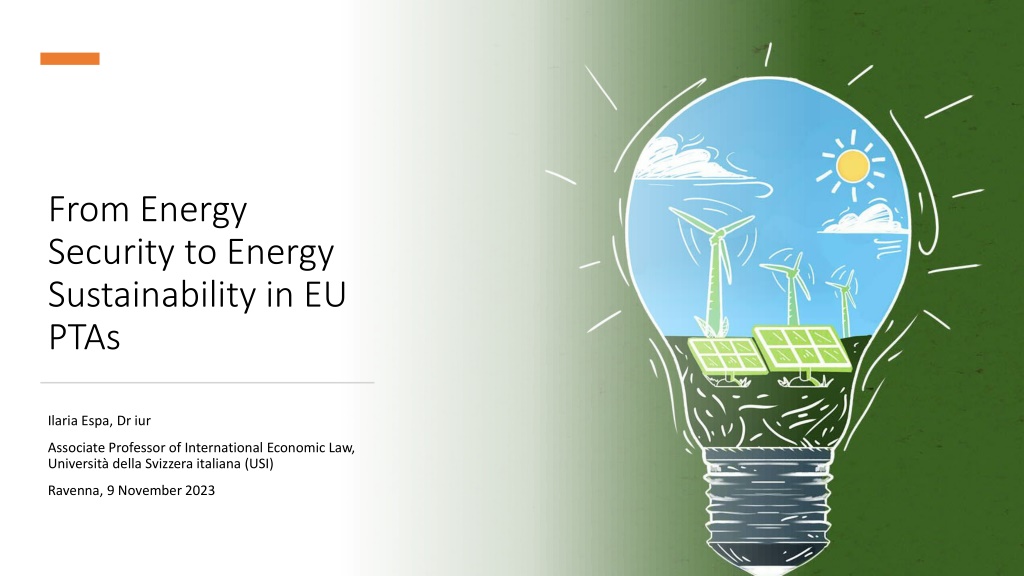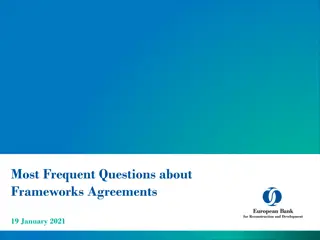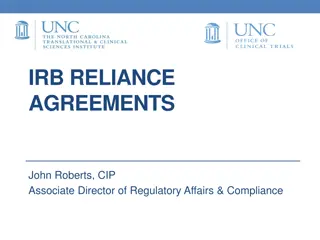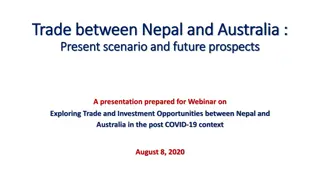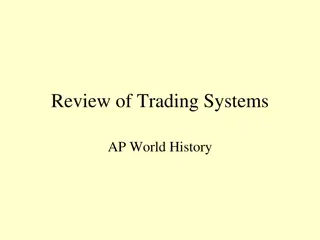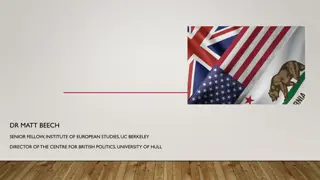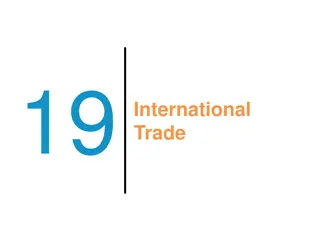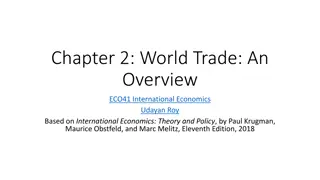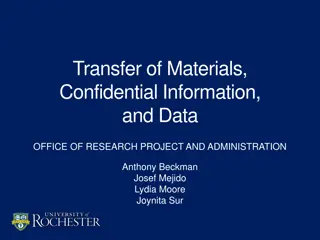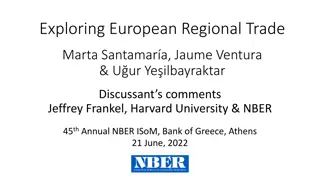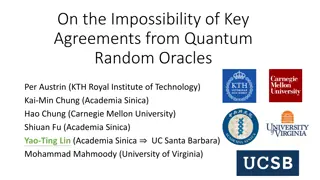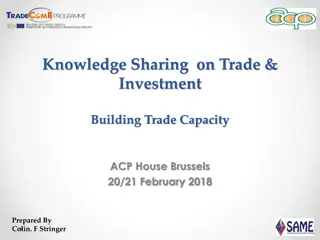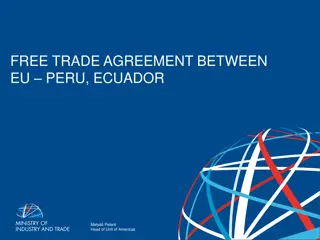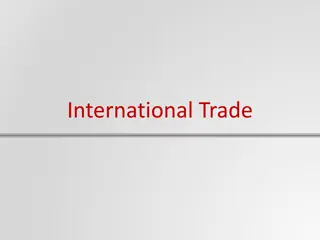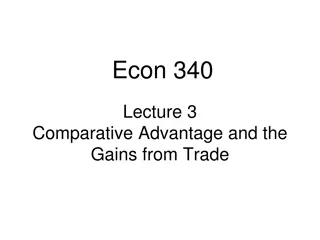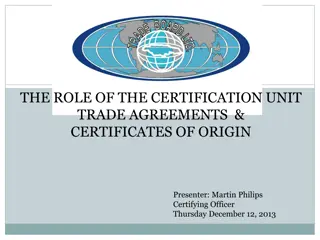Energy Security vs. Energy Sustainability in EU Trade Agreements
Explore the interplay between energy security and sustainability in EU trade agreements, focusing on the use of trade rules to promote both aspects. Discover how dedicated chapters address access to energy supplies and infrastructure, as well as provisions for renewable energy deployment and sustainable technologies.
Download Presentation

Please find below an Image/Link to download the presentation.
The content on the website is provided AS IS for your information and personal use only. It may not be sold, licensed, or shared on other websites without obtaining consent from the author. Download presentation by click this link. If you encounter any issues during the download, it is possible that the publisher has removed the file from their server.
E N D
Presentation Transcript
From Energy Security to Energy Sustainability in EU PTAs Ilaria Espa, Dr iur Associate Professor of International Economic Law, Universit della Svizzera italiana (USI) Ravenna, 9 November 2023
Interplay between energy security and sustainability in EU trade agreements Security-driven approach Use of trade rules to promote energy trade to address security concerns Focus is on access to energy goods and services Sustainability-driven approach How and to which extent can energy disciplines in (EU) preferential trade agreements contribute to both? Use of trade rules to promote environmentally sustainable energy trade to foster climate change action Focus is on facilitating the energy transition
The landscape of energy disciplines in EU trade agreements Security-driven disciplines primarily informed by the the objective to secure greater access to energy supplies, infrastructure and markets Dedicated chapters on energy (and raw materials) (Core rules in standard trade chapters) Dedicated chapters or provisions on non-tariff barriers to trade and investment in renewable energy Sustainability-driven disciplines primarily informed by the objective to foster the deployment of renewable energy and energy efficient technologies Provisions in chapters on sustainable development and/or on environment Relevant provisions in standard trade chapters
Energy security-driven provisions ACCESS TO ENERGY RESOURCES ACCESS TO ENERGY INFRASTRUCTURE ORGANIZATION OF MARKETS Rules disciplining access to and exercise of exploration and production activities Prohibition of dual pricing and/or import and export monopolies Prohibition of border measures (EU-Ukraine) and stricter conditions on the use of applicable exceptions (but see standard rules and exceptions) Transit (EU-Ukraine, EU- Chile) Third-party access provisions Cooperation on energy infrastructure developments Disciplines on domestic regulated pricing practices Cooperation between independent regulatory authorities and/or transmission system operators (EU-UK TCA), depending on the level of integration sought/possible
Integrating sustainability considerations in security- driven provisions Access to (conventional) energy resources (and raw materials) Obligation to carry out environmental impact assessments prior to granting exploration/production authorizations (EU-Chile, EU-New Zealand, EU-UK TCA) Obligation to respect high standards for environmental protection in exploration/production activities (EU-New Zealand, EU-UK TCA)) EU EU- -UK TCA UK TCA is the most advanced model, but hardly replicable Access to energy transport infrastructure Third party access for renewable energy producers, including balancing obligations (EU-New Zealand, EU-UK TCA) Cooperation on the interoperability of infrastructural aspects (e.g. access to networks, infrastructure planning, efficient use of electricity interconnectors) (EU- UK TCA) Organization of energy markets Provisions disciplining the functioning of wholesale and retail markets, balancing markets and capacity allocation mechanisms (EU-UK TCA) Ownership unbundling of TSOs (EU-UK TCA)
Energy sustainability-driven provisions Provisions tackling tariffs and non- tariff barriers to trade and investment Subsidies disciplines Focus on non-tariff barriers in the areas of renewable energy and/or energy efficiency specifically Focus on tariff (and non-tariff) barriers on environmental goods and services more generally Legal shelter for green subsidies related to the transition to a low- carbon economy Fossil fuel subsidy reform commitments
Provisions tackling tariffs and non-tariff barriers to trade and investment Focus on non-tariff barriers in the areas of renewable energy and/or energy efficiency Commitment to use international standards as a basis for technical regulations, standards and conformity assessment procedures (EU-Singapore, EU-Vietnam, EU-UK TCA) Commitment to not use discriminatory measures to promote renewable energy (e.g. local content requirements, joint venture requirements, etc.) (EU-Singapore, EU-Vietnam, EU-UK TCA) Cooperation between regulators and/or standardization bodies to promote regulatory convergence and the development of common standards (EU-Mexico, EU-Chile, EU-New Zealand, EU-UK TCA) Focus on tariff (and non-tariff) barriers on environmental goods and services General commitment to facilitate and promote trade and investment in environmental goods (unqualified (CETA) or qualified (EU and EFTA PTAs)) to enhance sustainable development and/or climate change Commitment to eliminate custom duties on extensive lists of (variously defined) environmental goods, including renewable and low carbon energy, energy efficiency and climate change mitigation and adaptation technologies (EU-New Zealand)
Subsidies disciplines Policy space for green subsidies Low ambition policy space no greater than under the ASCM (most PTAs) Middle ambition more or less detailed exemption clauses (primacy of public interest objective ) with different degrees of normativity and enforceability (EU-Singapore, EU-Vietnam) High ambition unprecedentedly specific and detailed provisions, both substantive and procedural, drawing from EU state aid law, (EU-Ukraine), including an Annex on Energy and Environmental Subsidies (EU-UK TCA) Fossil fuel subsidy (FFS) reform commitments Low ambition General commitment (hortatory, not enforceable) to progressively reduce fossil fuel subsidies (EU-Singapore) Middle ambition Commitment to work to meet the goal of reforming and progressively reducing FFS and to cooperate to pursue FFS reform in international fora, including the WTO (EU-New Zealand) High ambition Commitment to take steps to eliminate harmful FFS and to end unabated coal-fired electricity generation, direct financial support and international aid funding for fossil fuel energy (UK-New Zealand)
Concluding remarks Most energy-specific provisions respond to classical energy security concerns, but sustainability considerations are being increasingly integrated into security-driven provisions (win-win) Progressively standard (although not standardized) incorporation of energy sustainability- driven provisions, with various levels of ambition In both cases, most ambitious innovations concern a limited number of agreements Untapped potential More advanced energy disciplines essential to increase PTAs contribution to environmentally sustainable trade and to climate change action The conclusion of open plurilaterals like the AACTS could help accelerate norm diffusion and contribute to progress of WTO-led initiatives on environmental sustainability (e.g. TESSD dialogue) Ongoing shift?
